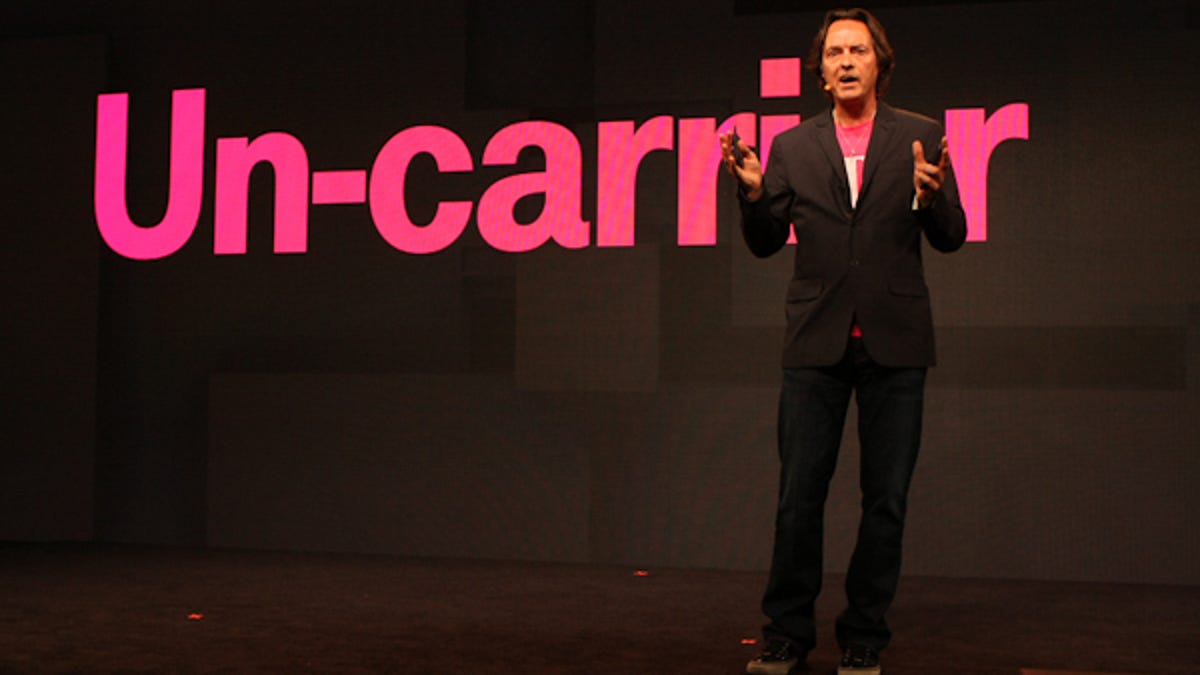Rivals beware, T-Mobile's gains are no fluke
The nation's smallest carrier says it is nabbing away high-end customers from AT&T and Sprint.

T-Mobile is proving it is no one-hit wonder.
The "Uncarrier" impressed on Tuesday with third-quarter results that yielded a second consecutive period in which it netted more than 1 million customers, with a large bulk of them being phone customers that its larger rivals have struggled to gain.
The results bring some relief to investors and critics who wondered if T-Mobile's gains in the second quarter -- its first as a public company -- were an aberration. They could turn out to be the start of trend.
"We have underestimated both the strength and the sustainability of T-Mobile's recovery," said Jonathan Chaplin, an analyst at New Street Research.
That should be a red flag to the other carriers out there, a few of which reported higher turnover and customer losses in the same period. T-Mobile doesn't appear to be stopping to catch its breath.
"Clearly, our Uncarrier strategy is resonating with customers," CEO John Legere said during a conference call with analysts on Tuesday. "We're going to continue to be disruptive, but we'll do it smartly and profitably."
The gains come as AT&T conceded it was facing pressure at the low end of its customer base, primarily of subscribers who used a basic phone, and Sprint lost a net 360,000 contract customers, also known as a post-paid customer.
T-Mobile, in contrast, added 648,000 net customers who are considered post-paid, even if they don't sign a contract.
Taking share
T-Mobile had been so disruptive in the second quarter that Moffet Nathanson Research analyst dubbed it a "Wireless Sharknado."
It appears to be at it again in the third quarter. T-Mobile Chief Marketing Officer Mike Sievert said the company was primarily taking high-end customers away from Sprint and AT&T.
AT&T, for its part, dismisses some of the pressure as customers on the low end, and touted the smartphone customer gains in the period.
T-Mobile had previously focused its attacks largely on AT&T because its customers could jump over to T-Mobile without switching phones. But it has more recently shifted its sights toward Sprint.
Legere hinted as much on the call, suggesting that T-Mobile could change its attack strategy based on vulnerabilities.
Legere mocked Sprint's Spark announcement, in which it promised higher LTE speeds in the coming years, noting that T-Mobile offers a faster network now.
Indeed, the difficulties that Sprint has faced getting its network issues settled have provided an opening for T-Mobile. Sprint warned last week that it would continue to see pressure on the customer side as it worked to improve its network. That's likely fuel for T-Mobile's growth in the coming quarters.
Impressively, T-Mobile's gains came without the benefit of the iPhone. Sievert said on the call that iPhones represented 15 percent of T-Mobile branded smartphone sales, which is significantly lower than rivals such as Verizon Wireless and Sprint. The
T-Mobile is also taking share away from lower cost prepaid providers. To that effect, T-Mobile said today that its MetroPCS prepaid arm would expand into 15 new markets on Nov. 21.
The next "pain point"?
T-Mobile's Uncarrier strategy has been predicated on addressing consumer annoyances with the wireless business, doing everything from eliminating contracts to offering free international data.
The next "pain point," as Legere likes to call them, could be the family plan.
"Family plans were not created for the benefit of the family," Legere said on the call. "It's another way of maximizing profitability for the larger carriers."
He said it wasn't ideal to offer a plan that would make family members fight at the dinner table over a limited pool of shared data. It's a similar pitch that Sprint has made with its own unlimited for life data guarantee.
Legere didn't offer specifics on how he would dismantle the family plan, which carriers like because they bundle together multiple subscribers. He only noted that as T-Mobile addresses the individual customers with its incentives, his rivals will have to do some "massive massaging" of the family plans to keep them together.
Not everything was perfect with T-Mobile this period. The company's average revenue per user sank faster than expected, falling to $45.38 from $50.55 a year ago. Executives said the average revenue would stabilize some time next year as more customers jump on its lower priced Simple Choice plans. The concerns are likely what is bringing down the shares, which are off 3.6 percent to $27.33.
Still, most analysts were pleased with the result. And despite the antics of CEO Legere, who is just as prone to drop an F-bomb as offer a new discount, many are gaining a newfound sense of respect for the company.
"Perhaps it is time to take T-Mobile seriously," Moffett said.

